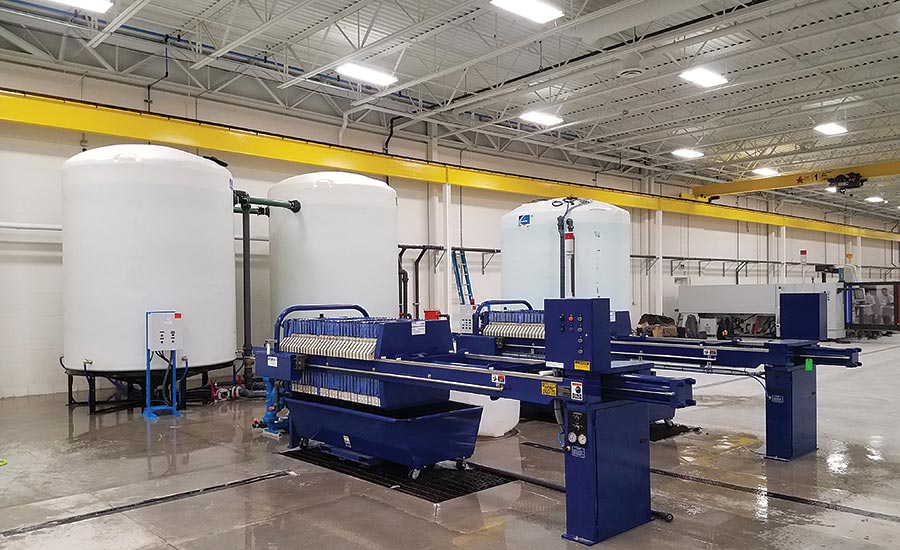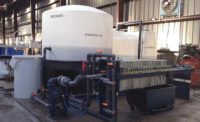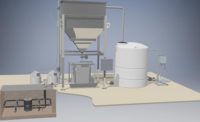It may seem like there are a lot of choices for water use and recycling, but in reality, there are few that actually comply with today’s discharge regulations and the specific water quality requirements of select fabrication equipment. Before making the investment in a water treatment system, here are some options to consider.
- Direct discharge to a city sewer or storm drain. If permitted by local authorities, city water is available to all equipment, provided water and sewer charges are acceptable costs of running the business. Often, the city is finding it more and more difficult to provide adequate volumes of water at acceptable water pressure. In addition, as federal authorities place ever-increasing restrictions on the discharges permitted by local authorities, their solution is to place tighter restrictions on all users of their sewer systems. Discharges must be kept to certain TSS, pH and metals levels. Average-sized shops can incur charges of $2,000 to $3,000 per month, guaranteed to rise in the future.
- Simple gravity settling with direct discharge. Similar to #1 above, but incorporates one or more settling pits or above-ground tanks designed to help remove larger solids from the waste stream prior to discharge to the city sewer or storm drain. Some companies will try and recycle some of this water back to their bridge saw(s) and other equipment. Many shops attempt to recycle as much of this water as possible, often to equipment not designed to manage this volume of solids — some often use simple cartridge filtration to help remove more solids. In a small shop environment, this will work for a while, however, many equipment manufacturers will not stand behind their warranty with water supplied to critical pieces of equipment when this filtration method is employed. As in #1 above, any discharge to the city requires a permit to be legal and the same contaminant control is required. While the discharged volume is reduced, local charges can still be expensive.
- Gravity settling with chemicals, with or without direct discharge. Advancing on the simpler solution of #2 above, traditional gravity settling often incorporates a chemical known as a flocculant to advance or speed up the settling process in an above-ground tank or inclined plate clarifier, hopefully removing increased volumes of solids. Whatever solids do settle, and some do not, are then removed by a collection bag or small filter press. Recycled water is then taken from the top of the settling tank and sent to the various pieces of equipment in the shop. In virtually all cases, additional settling tank(s) and cartridge filtration are required to obtain the water quality required. Discharge to a city sewer or storm drain is almost always required as many, not all, equipment manufacturers will not stand behind their warranty with water supplied to critical pieces of equipment by a chemical-based, gravity settling design. As above, any discharge to the city requires a permit to be legal and the same contaminant control is required.
- Water Recycling with filter press technology. Filter press systems, designed to provide a closed-loop, zero-discharge solution, were first introduced to the stone industry in 1998. The patented design provides both clear water, filtered to less than 2 micron, and gray/white water filtered to less than 25 micron. These two levels of water quality meet the specific needs of all your polishing and cutting fabrication equipment requirements. No chemicals are required, no discharge is necessary, and dry solid filter cakes are generated and can easily be disposed of. Certainly it can be said that this design requires more of the customer than do the others noted above. But much in the same way that your CNC requires more knowledge than does your bridge saw. With advanced technology, a life-time guarantee and freedom from local and federal regulators comes a commitment to understand the design.
The biggest challenge this technology faces in the stone industry is the perception advanced by sales competition that it takes so much time to provide service. The reality is that all designs require service. Managing and balancing a gravity settling chemical system, the multiple bags generated that no waste hauler will remove from your site until completely dry and many will require you to remove the bag, are just a few challenges faced. You will also not receive any water quality guarantee, much less a life-time one, and then there is the issue of service support after the sale.
Several different automation options are available that can reduce your service time to just 15 minutes on average.
Ensuring your employees and machinery are working with the cleanest and safest water does require more than a pit and a pump. A 100% closed-loop water recycling system does require system monitoring, but anything that is of quality takes some effort.
It is important to work with a company that knows water. Do they know how to service your system? And do they know about the various pieces of equipment and manufactures in the stone industry – including the equipment’s water demands and water quality required?
And last but not least, did you know that a properly designed filter press system, if you are running a 100% wet shop, will cut down on air born silica?
Being an educated buyer is the best tool you can have in making the right decision about water filtration and recycling for your operation. Make sure that who you are working with is willing to educate you about the differences between their system and other types of systems in the marketplace.






